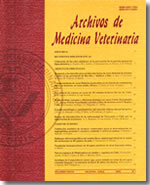Case descriptions of chronic pectoral abscess and variables associated with its occurrence in equines, in the Ñuble Province, Chile
Main Article Content
Abstract
The chronic pectoral abscess (APC) is a seasonal infectious disease which affects equines and it is caused by Corynebacteriumpseudotuberculosis. A cross-sectional study was carried out in 31 herds of the Nuble Province, VIII Region, Chile, that had reported cases of APC from November of 1999 to April of 2000 to the National Animal Health Service (SAG). Individual information and handling of all the equines from herds of reported cases, was collected by means of a survey developed by SAG. The most frequent signs were: external abscesses (79.6%), oedema (100%), decay (61.1%) and fever (31.5%). Necrosis was not reported. 83.3% of the affected equines recovered within three weeks, whereas 12.9% developed a chronic condition; mortality was 1.8%. A final model was developed by means of a multiple logistic regression analysis, using Stata S/E V9 (StataCorp 2005). The model indicated that the factors associated with an increase of the probability of disease were the horses being of the Creole type (OR = 6.17; IC 95% = 2.43-15.69) and administrating antiparasitic once a year (OR = 4.8; IC 95% = 2.13-10.79) with a prediction level of 70.5%. It is necessary to study the intrinsic and extrinsic characteristics of creóle equines that make them more susceptible to APC. The relationship between the disease and the characteristics of the used annual antiparasitic should be studied to determine the link between them. Further studies consisting of observational designs would allow the analysis of causality which would help in the design of a causal model for this disease in the VIII Region.

